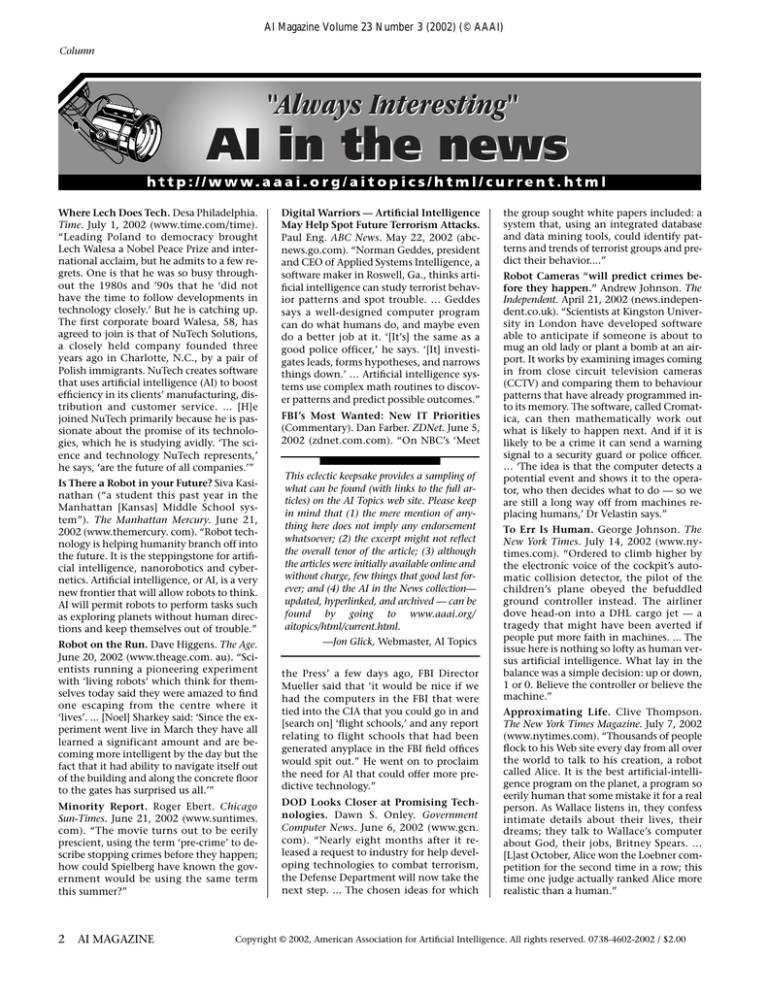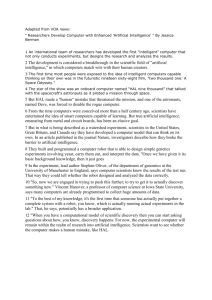
AI Magazine Volume 23 Number 3 (2002) (© AAAI)
Column
Where Lech Does Tech. Desa Philadelphia.
Time. July 1, 2002 (www.time.com/time).
“Leading Poland to democracy brought
Lech Walesa a Nobel Peace Prize and international acclaim, but he admits to a few regrets. One is that he was so busy throughout the 1980s and ’90s that he ‘did not
have the time to follow developments in
technology closely.’ But he is catching up.
The first corporate board Walesa, 58, has
agreed to join is that of NuTech Solutions,
a closely held company founded three
years ago in Charlotte, N.C., by a pair of
Polish immigrants. NuTech creates software
that uses artificial intelligence (AI) to boost
efficiency in its clients’ manufacturing, distribution and customer service. ... [H]e
joined NuTech primarily because he is passionate about the promise of its technologies, which he is studying avidly. ‘The science and technology NuTech represents,’
he says, ‘are the future of all companies.’”
Is There a Robot in your Future? Siva Kasinathan (“a student this past year in the
Manhattan [Kansas] Middle School system”). The Manhattan Mercury. June 21,
2002 (www.themercury. com). “Robot technology is helping humanity branch off into
the future. It is the steppingstone for artificial intelligence, nanorobotics and cybernetics. Artificial intelligence, or AI, is a very
new frontier that will allow robots to think.
AI will permit robots to perform tasks such
as exploring planets without human directions and keep themselves out of trouble.”
Digital Warriors — Artificial Intelligence
May Help Spot Future Terrorism Attacks.
Paul Eng. ABC News. May 22, 2002 (abcnews.go.com). “Norman Geddes, president
and CEO of Applied Systems Intelligence, a
software maker in Roswell, Ga., thinks artificial intelligence can study terrorist behavior patterns and spot trouble. … Geddes
says a well-designed computer program
can do what humans do, and maybe even
do a better job at it. ‘[It’s] the same as a
good police officer,’ he says. ‘[It] investigates leads, forms hypotheses, and narrows
things down.’ … Artificial intelligence systems use complex math routines to discover patterns and predict possible outcomes.”
FBI’s Most Wanted: New IT Priorities
(Commentary). Dan Farber. ZDNet. June 5,
2002 (zdnet.com.com). “On NBC’s ‘Meet
This eclectic keepsake provides a sampling of
what can be found (with links to the full articles) on the AI Topics web site. Please keep
in mind that (1) the mere mention of anything here does not imply any endorsement
whatsoever; (2) the excerpt might not reflect
the overall tenor of the article; (3) although
the articles were initially available online and
without charge, few things that good last forever; and (4) the AI in the News collection—
updated, hyperlinked, and archived — can be
found by going to www.aaai.org/
aitopics/html/current.html.
—Jon Glick, Webmaster, AI Topics
Robot on the Run. Dave Higgens. The Age.
June 20, 2002 (www.theage.com. au). “Scientists running a pioneering experiment
with ‘living robots’ which think for themselves today said they were amazed to find
one escaping from the centre where it
‘lives’. ... [Noel] Sharkey said: ‘Since the experiment went live in March they have all
learned a significant amount and are becoming more intelligent by the day but the
fact that it had ability to navigate itself out
of the building and along the concrete floor
to the gates has surprised us all.’”
the Press’ a few days ago, FBI Director
Mueller said that ‘it would be nice if we
had the computers in the FBI that were
tied into the CIA that you could go in and
[search on] ‘flight schools,’ and any report
relating to flight schools that had been
generated anyplace in the FBI field offices
would spit out.” He went on to proclaim
the need for AI that could offer more predictive technology.”
Minority Report. Roger Ebert. Chicago
Sun-Times. June 21, 2002 (www.suntimes.
com). “The movie turns out to be eerily
prescient, using the term ‘pre-crime’ to describe stopping crimes before they happen;
how could Spielberg have known the government would be using the same term
this summer?”
DOD Looks Closer at Promising Technologies. Dawn S. Onley. Government
Computer News. June 6, 2002 (www.gcn.
com). “Nearly eight months after it released a request to industry for help developing technologies to combat terrorism,
the Defense Department will now take the
next step. ... The chosen ideas for which
2
AI MAGAZINE
the group sought white papers included: a
system that, using an integrated database
and data mining tools, could identify patterns and trends of terrorist groups and predict their behavior....”
Robot Cameras “will predict crimes before they happen.” Andrew Johnson. The
Independent. April 21, 2002 (news.independent.co.uk). “Scientists at Kingston University in London have developed software
able to anticipate if someone is about to
mug an old lady or plant a bomb at an airport. It works by examining images coming
in from close circuit television cameras
(CCTV) and comparing them to behaviour
patterns that have already programmed into its memory. The software, called Cromatica, can then mathematically work out
what is likely to happen next. And if it is
likely to be a crime it can send a warning
signal to a security guard or police officer.
… ‘The idea is that the computer detects a
potential event and shows it to the operator, who then decides what to do — so we
are still a long way off from machines replacing humans,’ Dr Velastin says.”
To Err Is Human. George Johnson. The
New York Times. July 14, 2002 (www.nytimes.com). “Ordered to climb higher by
the electronic voice of the cockpit’s automatic collision detector, the pilot of the
children’s plane obeyed the befuddled
ground controller instead. The airliner
dove head-on into a DHL cargo jet — a
tragedy that might have been averted if
people put more faith in machines. ... The
issue here is nothing so lofty as human versus artificial intelligence. What lay in the
balance was a simple decision: up or down,
1 or 0. Believe the controller or believe the
machine.”
Approximating Life. Clive Thompson.
The New York Times Magazine. July 7, 2002
(www.nytimes.com). “Thousands of people
flock to his Web site every day from all over
the world to talk to his creation, a robot
called Alice. It is the best artificial-intelligence program on the planet, a program so
eerily human that some mistake it for a real
person. As Wallace listens in, they confess
intimate details about their lives, their
dreams; they talk to Wallace’s computer
about God, their jobs, Britney Spears. …
[L]ast October, Alice won the Loebner competition for the second time in a row; this
time one judge actually ranked Alice more
realistic than a human.”
Copyright © 2002, American Association for Artificial Intelligence. All rights reserved. 0738-4602-2002 / $2.00




